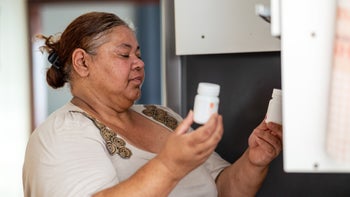
Stopping Hormone Replacement Therapy (HRT): Managing Side Effects
Key takeaways:
Menopausal hormone replacement therapy (HRT) can help improve symptoms during menopause — from hot flashes to mood changes.
Menopausal HRT has some risks and side effects, and most people don’t take it forever.
There are ways to successfully stop menopausal HRT and support your body in this transition.
Table of contents

Menopausal hormone replacement therapy (HRT) works to replace the hormones that drop during menopause. You’ve probably heard of estrogen and progesterone, the reproductive hormones the ovaries make. These hormones are in charge of puberty, sex drive, menstruation, and pregnancy. They also contribute to bone health, sleep, and mood.
Taking HRT during menopause can help to reduce the symptoms that some people experience. Common symptoms of menopause that improve with HRT are hot flashes, disturbed sleep, mood changes, and even joint aches and pains.
But HRT also comes with some risks and side effects. This is why most people don’t take it for more than 5 years. Stopping HRT can have its own set of challenges and risks.
Let’s take a closer look at when and how to safely cut back on HRT and how to manage the side effects.
How does hormone replacement therapy work?
Menopausal HRT works by replacing your natural hormones that decrease with menopause. Menopausal HRT is either estrogen alone — or both estrogen and progesterone. The treatment comes in various forms:
Pill
Shot
Implant
Patch
Vaginal insert
Is it safe to take HRT for menopause? Here’s what the research says about the safety of hormone replacement therapy (HRT).
Menopause treatment savings: Learn more about how you can save on menopause treatments.
Non-hormonal treatment options for menopause: Find out more about non-hormonal treatments for menopause.
A healthcare professional can help you understand your options and what type of HRT might be right for you.
What are the side effects of hormone replacement therapy?
You may experience side effects of menopausal HRT. And these can make you think about decreasing your dose or stopping it completely. These side effects may include:
Headaches
Nausea
Bloating or diarrhea
Breast tenderness
Acne or skin changes
Change in sex drive (libido)
The side effects of menopausal HRT will slowly ease off as you lower your dose of HRT. Once you stop the medication, the side effects will go away completely. But depending on how quickly you stop or lower your HRT, you may experience some other symptoms (more on these below).
Does HRT cause weight gain?
No. The research shows that menopausal HRT doesn’t cause weight gain. That being said, it’s common to gain a small amount of weight during this time of life. Stopping HRT won’t make much difference for your weight. But other factors can affect your weight, including your diet and exercise habits.
What are the risks of hormone replacement therapy for menopause?
As with any medication, there are a range of risks with menopausal HRT. And they go up as you get older. The risks also increase the longer you take HRT. Menopausal HRT can increase your risk of the following health conditions:
Stroke
Blood clots
Uterine cancer
Breast cancer
This is why experts recommend using HRT at the lowest dose that works and for the shortest amount of time needed to improve symptoms. When the symptoms of menopause start to decrease, you can begin to lower your dose. This is generally after about 5 years of use.
You’ll want to review your individual risks and benefits with a healthcare professional. There may be ways to decrease your risks from menopausal HRT, including:
Starting HRT within 10 years of menopause, before the age of 60
Using a low dose of estrogen
Using transdermal estrogen (patch or gel)
Using progesterone if you have a uterus
What side effects can you expect when you start reducing doses of HRT?
When you start to decrease your dose of menopausal HRT, you may notice some symptoms. The cause of these symptoms is usually a dropping level of estrogen. Symptoms may include:
Hot flashes
Night sweats
Mood changes (anxiety and depression)
These symptoms should be mild and will decrease with time as you slowly wean off the hormones.
How long does HRT stay in your system after stopping?
It depends. While it can take up to a week or so for HRT medication to leave your system, you may still feel the effects. How long you’ll feel the effects of HRT after stopping will vary, depending on the type of HRT you’re taking and how long you’ve been taking it.
In general, you should take 2 to 4 months to gradually decrease your current dose so your body can adjust to the changes.
How do you know when you’re ready to stop HRT?
It can be hard to know when it’s the right time to stop HRT. When you start HRT for menopause, it’s a good idea to also start thinking about when you plan to stop. It can be helpful to monitor your menopausal symptoms over time. Your prescriber can also be a good source of support in making the decision to start lowering your dose.
It may be time to consider decreasing your dose and starting to wean off menopausal HRT if any of the following apply:
Your menopausal symptoms are decreasing
You’ve been using HRT for close to 5 years or more
You’re approaching age 60
You’ve been in menopause for close to 10 years
What’s the safest way to stop hormone replacement therapy?
Be sure to discuss reducing or stopping your menopausal HRT with a healthcare professional. In many cases, you can limit the side effects by slowly lowering your dose over time. You may want to try switching to a lower dose and/or fewer days per week while paying close attention to your symptoms.
If your symptoms return, it’ll be important to weigh the risks and benefits of continuing HRT. If you aren’t sure, a talk with your prescriber may help.
What happens when you stop HRT cold turkey?
If you stop HRT cold turkey (suddenly) rather than tapering off the dose, you may be more likely to experience symptoms of estrogen withdrawal. These can include:
Hot flashes
Night sweats
Insomnia
Anxiety
Mood disturbances
Vaginal dryness
Are there risks to stopping HRT?
The most likely risk is that your menopausal symptoms return. Some research also suggests a rise in blood pressure and a slight increase in risk of heart attack or stroke in the year after stopping HRT. But overall, the risks of stopping HRT are low. And you can do it in a slow, comfortable, and safe way.
What are the best HRT alternatives to support menopausal symptoms naturally?
As you think about lowering and stopping menopausal HRT, there may be some natural or over-the-counter (OTC) treatments for menopausal symptoms. These include nutrition and dietary changes, certain supplements, and exercise.
And, depending on your symptoms, there are also some nonhormonal medications you may consider. Examples include:
Selective serotonin reuptake inhibitors (SSRIs) or Serotonin-norepinephrine reuptake inhibitors (SNRIs), including paroxetine (Paxil) or venlafaxine (Effexor)
Antiepileptics, such as gabapentin (Neurontin)
Vaginal treatments, such as lubricants or vaginal estrogen
Veozah (fezolinetant)
Frequently asked questions
HRT can help some people manage their severe menopause symptoms that are interfering with daily activities. But there are some risks. In some people, HRT may increase the risk of blood clots, stroke, and certain types of cancer. If you’re menopausal, talk to a healthcare professional about your health history to see if HRT is a good treatment option for you.
People at greater risk for complications shouldn’t take hormone therapy for menopause. This includes people who have a history of:
Breast, ovarian, or uterine cancer
Blood clots
Stroke
Heart attack
Liver disease
The decision to take HRT is a personal one that you have to make with a healthcare professional. The decision should be made together based on your symptoms, health history, and the risks and benefits of HRT for you. This decision will vary from person to person.
The bottom line
Menopause is a natural part of life. But for some people, it comes with some bothersome side effects that can have a big impact on quality of life. Menopausal HRT is an effective way to improve those symptoms. But it isn’t for long-term use. At some point, you and a healthcare professional will start to plan for lowering your dose and stopping it completely. When that time comes, it’s good to know your options so you can safely manage this transition.
Why trust our experts?


References
American College of Obstetricians and Gynecologists. (2024). Hormone therapy for menopause.
Breastcancer.org. (2022). Doctors favor gradually stopping hormone replacement therapy.
Kongnyuy, E. J., et al. (2000). Hormone replacement therapy has no effect on body weight and cannot prevent weight gain at menopause. Cochrane Database of Systematic Reviews.
Martin, K. A., et al. (2008). Approach to the patient with menopausal symptoms.
Mikkola, T. S., et al. (2015). Increased cardiovascular mortality risk in women discontinuing postmenopausal hormone therapy. The Journal Clinical Endocrinology and Metabolism.
National Cancer Institute. (2023). Menopausal hormone therapy and cancer.
National Health Service. (2023). Side effects of hormone replacement therapy (HRT).
Shoupe, D. (2011). Individualizing hormone therapy to minimize risk: Accurate assessment of risks and benefits. Women’s Health.
Suffoletto, J., et al. (2009). Tapering vs. cold turkey: Symptoms vs. successful discontinuation of menopausal hormone therapy. Menopause.
Warren, M. P., et al. (2013). Quality of life and hypertension after hormone therapy withdrawal in New York City. Menopause.

























